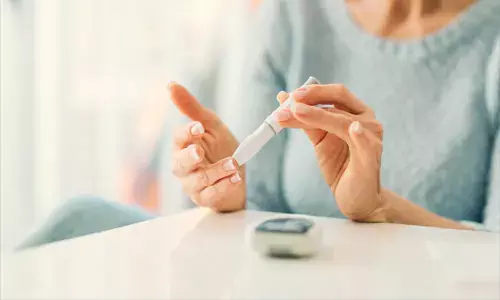- Home
- Medical news & Guidelines
- Anesthesiology
- Cardiology and CTVS
- Critical Care
- Dentistry
- Dermatology
- Diabetes and Endocrinology
- ENT
- Gastroenterology
- Medicine
- Nephrology
- Neurology
- Obstretics-Gynaecology
- Oncology
- Ophthalmology
- Orthopaedics
- Pediatrics-Neonatology
- Psychiatry
- Pulmonology
- Radiology
- Surgery
- Urology
- Laboratory Medicine
- Diet
- Nursing
- Paramedical
- Physiotherapy
- Health news
- Fact Check
- Bone Health Fact Check
- Brain Health Fact Check
- Cancer Related Fact Check
- Child Care Fact Check
- Dental and oral health fact check
- Diabetes and metabolic health fact check
- Diet and Nutrition Fact Check
- Eye and ENT Care Fact Check
- Fitness fact check
- Gut health fact check
- Heart health fact check
- Kidney health fact check
- Medical education fact check
- Men's health fact check
- Respiratory fact check
- Skin and hair care fact check
- Vaccine and Immunization fact check
- Women's health fact check
- AYUSH
- State News
- Andaman and Nicobar Islands
- Andhra Pradesh
- Arunachal Pradesh
- Assam
- Bihar
- Chandigarh
- Chattisgarh
- Dadra and Nagar Haveli
- Daman and Diu
- Delhi
- Goa
- Gujarat
- Haryana
- Himachal Pradesh
- Jammu & Kashmir
- Jharkhand
- Karnataka
- Kerala
- Ladakh
- Lakshadweep
- Madhya Pradesh
- Maharashtra
- Manipur
- Meghalaya
- Mizoram
- Nagaland
- Odisha
- Puducherry
- Punjab
- Rajasthan
- Sikkim
- Tamil Nadu
- Telangana
- Tripura
- Uttar Pradesh
- Uttrakhand
- West Bengal
- Medical Education
- Industry
Pulsatile insulin infusion improves kidney function, BP and patient satisfaction in diabetes: Study

improvement of kidney function, systolic blood pressure, and treatment satisfaction in patients with type 2 diabetes
According to recent research, it has been found out that pulsatile insulin infusion therapy (PIT) appears to be a potentially effective way to induce an improvement of kidney function, systolic blood pressure, and treatment satisfaction in patients with type 2 diabetes.
The study is published in the Diabetes Care Journal.
Mimicking the physiological pancreatic pulsatile insulin secretion has led to the concept of pulsatile insulin infusion therapy (PIT).
It has been shown that short-term pulsatile intravenous insulin administration (pulsatile insulin therapy, PIT) leads to a significant increase in insulin sensitivity. The effects of PIT on the progression of chronic renal failure in patients with type 1 diabetes were studied in randomized studies.
Besides the renal effects, positive effects of PIT on metabolic control, arterial hypertension and other diabetes complications and co-morbidities in such patients have been reported. However, awareness of PIT's existence is low, and only very few clinical sites offer it as a treatment option.
No results from documented studies have been published to date about the impact of PIT on kidney function in patients with type 2 diabetes
Hence, Manessis A and colleagues from the NYU Grossman School of Medicine, NY, USA carried out the pilot study to investigate the effect of once weekly PIT for 3 months on kidney function in patients with type 2 diabetes and chronic renal failure (glomerular filtration rate (GFR) < 60 mL/min or GFR < 75 mL/min with macroproteinurea).
The authors revealed the following findings-
- Of 22 enrolled type 2 patients, 17 completed the trial per protocol (7 women, 10 men, age: 69 ± 7 yrs., HbA1c: 7.9 ± 1.0%).
- After 3 months, mean GFR improved by 12% (from 47.6 ± 10.0 mL/min to 53.3 ± 11.9 mL/min, p < 0.01) and mean serum creatinine decreased by 7% (1.4 ± 0.3 mg/dL/1.3 ± 0.3 mg/dL, p < 0.05).
- Systolic blood pressure improved by 6% (p < 0.05), while HbA1c and body weight remained stable.
- The treatment satisfaction score improved from 3.7 ± 2.7 to 2.7 ± 2.1 (p < 0.005).
- The PIT procedures were well tolerated and only few cases of muscle cramps were considered to be related to the treatments.
Therefore, the authors concluded that "Improvements in kidney function, systolic blood pressure and treatment satisfaction were observed after 3 months of PIT in patients with type 2 diabetes and renal failure in this pilot trial. These results will now be used to plan for appropriately designed controlled confirmatory studies."
Dr. Nandita Mohan is a practicing pediatric dentist with more than 5 years of clinical work experience. Along with this, she is equally interested in keeping herself up to date about the latest developments in the field of medicine and dentistry which is the driving force for her to be in association with Medical Dialogues. She also has her name attached with many publications; both national and international. She has pursued her BDS from Rajiv Gandhi University of Health Sciences, Bangalore and later went to enter her dream specialty (MDS) in the Department of Pedodontics and Preventive Dentistry from Pt. B.D. Sharma University of Health Sciences. Through all the years of experience, her core interest in learning something new has never stopped. She can be contacted at editorial@medicaldialogues.in. Contact no. 011-43720751
Dr Kamal Kant Kohli-MBBS, DTCD- a chest specialist with more than 30 years of practice and a flair for writing clinical articles, Dr Kamal Kant Kohli joined Medical Dialogues as a Chief Editor of Medical News. Besides writing articles, as an editor, he proofreads and verifies all the medical content published on Medical Dialogues including those coming from journals, studies,medical conferences,guidelines etc. Email: drkohli@medicaldialogues.in. Contact no. 011-43720751


